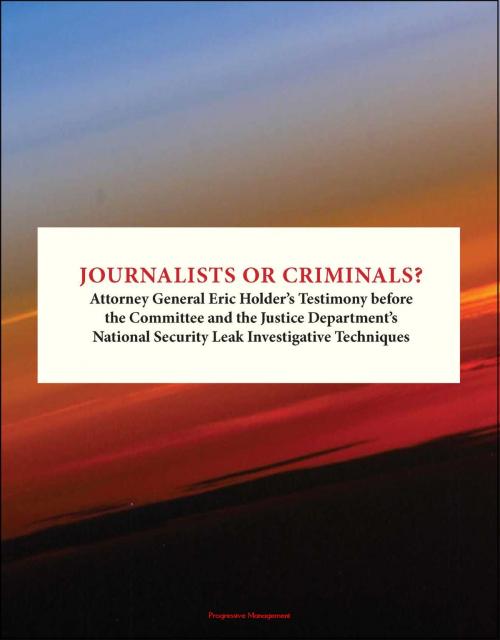Journalists or Criminals? Attorney General Eric Holder's Testimony before the Committee and the Justice Department's National Security Leak Investigative Techniques
Nonfiction, Social & Cultural Studies, Political Science| Author: | Progressive Management | ISBN: | 9781301935499 |
| Publisher: | Progressive Management | Publication: | August 4, 2013 |
| Imprint: | Smashwords Edition | Language: | English |
| Author: | Progressive Management |
| ISBN: | 9781301935499 |
| Publisher: | Progressive Management |
| Publication: | August 4, 2013 |
| Imprint: | Smashwords Edition |
| Language: | English |
This is the majority Republican staff report to Chairman Bob Goodlatte of the House Committee on the Judiciary issued on July 31, 2013 about the controversy over Attorney General Eric Holder's testimony. The Executive Summary states:
The recent controversy surrounding Attorney General Eric Holder, Jr. and his testimony before the House Judiciary Committee is the result of deliberate efforts by Mr. Holder to avoid answering for questionable decisions and actions in the performance of his official duties. In particular, Mr. Holder's testimony was an attempt, through verbal gymnastics, to circumvent proper congressional oversight and accountability by distorting the truth about the Justice Department's investigative techniques targeting journalists.
Mr. Holder assured the Committee, in sworn testimony, that "[w]ith regard to potential prosecution of the press for the disclosure of material, that is not something that I have ever been involved, heard of, or would think would be a wise policy'" Yet, as the Committee learned after its May 15, 2013, hearing, in 2010, the Justice Department obtained a search warrant for Fox News Chief Washington Correspondent James Rosen's emails by swearing to a federal court that Mr. Rosen was a co-conspirator in a national security leak investigation. When questioned by the committee about the obvious clash between his testimony and the truth, Mr. Holder refused to answer questions from the Committee. Finally, after weeks of delay, Mr. Holder responded to the Committee's inquiry. However, Mr. Holder's responses do not ameliorate our concern that his testimony to the committee was deceptive and misleading. we take little comfort in Mr. Holder's assurances to us now that the Department never intended to prosecute Mr. Rosen when it labeled him a criminal suspect in 2010.
Tarnishing a journalist as a suspect in a national security investigation is not something that should be taken lightly. Espionage is a serious federal crime, punishable by up to a decade in prison. In essence, the Justice Department dangled Mr. Rosen over a cliff. But the American people were then assured by Mr. Holder that this was appropriate because there was never a potential of him falling to his doom.
In response to the nationwide disapproval of his tactics, Mr. Holder has proposed new rules and regulations to control the Justice Department's dealings with the media. While some of these proposals are welcome, the committee is dismayed that Mr. Holder suggests that congress change the law to stop him from continuing to do what he has done in the past - distort federal law to fit his investigative prerogatives. Mr. Holder proposes that congress amend the privacy Protection Act of 1980, a law intended to prohibit the government from searching a journalist's records unless the journalist is a criminal suspect. Mr. Holder maintains that the law contains a loophole that permits the government to do what it did in the Rosen case. But there is no such loophole. If Mr. Holder believes that the law should not permit the Justice Department to do what it did, he never should have authorized the search warrant in the first place. The committee believes that Mr. Holder is trying to deflect responsibility for his actions by presenting a distorted reading of the law. Changing the law is not the solution for misuse of the law.
The Committee finds that Mr. Holder's sworn testimony in the Rosen matter was deceptive and misleading. No amount of law-making can restore credibility and professionalism to the Justice Department in the wake of these revelations. The only way to achieve this goal is through an improvement in the quality of leadership at the Justice Department.
This is the majority Republican staff report to Chairman Bob Goodlatte of the House Committee on the Judiciary issued on July 31, 2013 about the controversy over Attorney General Eric Holder's testimony. The Executive Summary states:
The recent controversy surrounding Attorney General Eric Holder, Jr. and his testimony before the House Judiciary Committee is the result of deliberate efforts by Mr. Holder to avoid answering for questionable decisions and actions in the performance of his official duties. In particular, Mr. Holder's testimony was an attempt, through verbal gymnastics, to circumvent proper congressional oversight and accountability by distorting the truth about the Justice Department's investigative techniques targeting journalists.
Mr. Holder assured the Committee, in sworn testimony, that "[w]ith regard to potential prosecution of the press for the disclosure of material, that is not something that I have ever been involved, heard of, or would think would be a wise policy'" Yet, as the Committee learned after its May 15, 2013, hearing, in 2010, the Justice Department obtained a search warrant for Fox News Chief Washington Correspondent James Rosen's emails by swearing to a federal court that Mr. Rosen was a co-conspirator in a national security leak investigation. When questioned by the committee about the obvious clash between his testimony and the truth, Mr. Holder refused to answer questions from the Committee. Finally, after weeks of delay, Mr. Holder responded to the Committee's inquiry. However, Mr. Holder's responses do not ameliorate our concern that his testimony to the committee was deceptive and misleading. we take little comfort in Mr. Holder's assurances to us now that the Department never intended to prosecute Mr. Rosen when it labeled him a criminal suspect in 2010.
Tarnishing a journalist as a suspect in a national security investigation is not something that should be taken lightly. Espionage is a serious federal crime, punishable by up to a decade in prison. In essence, the Justice Department dangled Mr. Rosen over a cliff. But the American people were then assured by Mr. Holder that this was appropriate because there was never a potential of him falling to his doom.
In response to the nationwide disapproval of his tactics, Mr. Holder has proposed new rules and regulations to control the Justice Department's dealings with the media. While some of these proposals are welcome, the committee is dismayed that Mr. Holder suggests that congress change the law to stop him from continuing to do what he has done in the past - distort federal law to fit his investigative prerogatives. Mr. Holder proposes that congress amend the privacy Protection Act of 1980, a law intended to prohibit the government from searching a journalist's records unless the journalist is a criminal suspect. Mr. Holder maintains that the law contains a loophole that permits the government to do what it did in the Rosen case. But there is no such loophole. If Mr. Holder believes that the law should not permit the Justice Department to do what it did, he never should have authorized the search warrant in the first place. The committee believes that Mr. Holder is trying to deflect responsibility for his actions by presenting a distorted reading of the law. Changing the law is not the solution for misuse of the law.
The Committee finds that Mr. Holder's sworn testimony in the Rosen matter was deceptive and misleading. No amount of law-making can restore credibility and professionalism to the Justice Department in the wake of these revelations. The only way to achieve this goal is through an improvement in the quality of leadership at the Justice Department.















